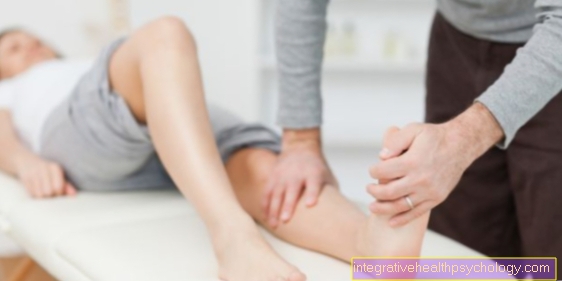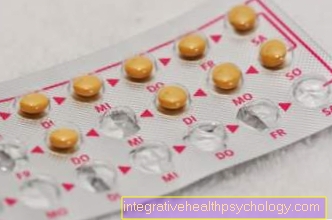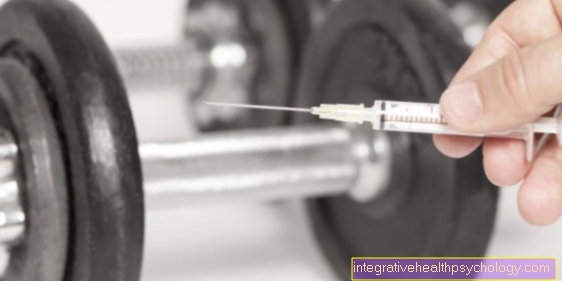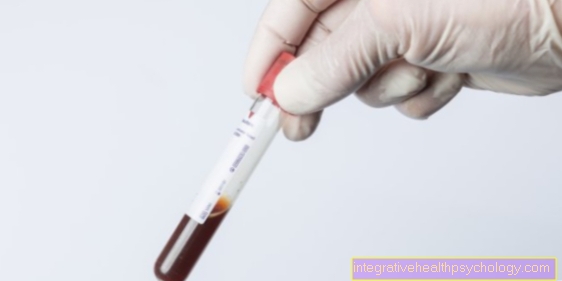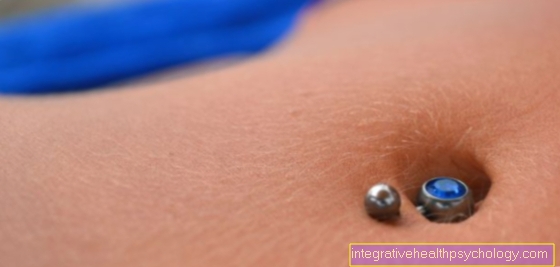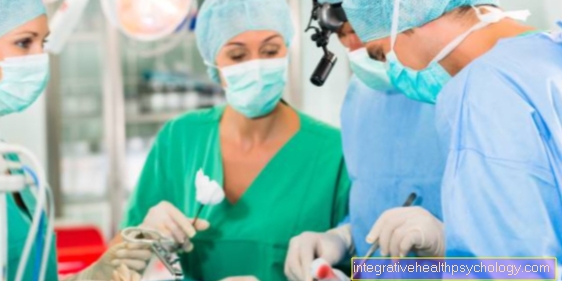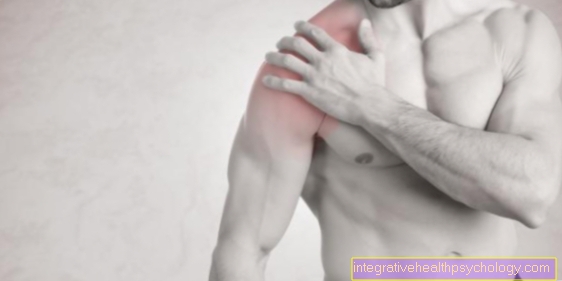Pain after hip surgery
definition
In most cases, pain after hip surgery is localized around the affected hip.
In most cases, they occur after hip operations. The pain is usually felt by the patient for the first time a few hours after the operation, when the narcotic and analgesic drugs that were used during the operation wear off. Most often it is wound pain and pain due to manipulation and damage to the tissue around the hip.
Pain in other parts of the body due to the positioning during the operation can occur less often.

What pain is normal
The pain after hip surgery can vary from person to person.
Hip operations involve a great deal of force on the hips, pelvis and legs. Severe pain can occur in the operating area, which does not get better when you rest. The pain can radiate and typically gets worse with hip movement. The pain should be manageable with adequate pain treatment.
If the pain medication is insufficient, the person affected should ask the treating doctor to adjust the pain medication. After a few weeks, the pain should go away. If the pain does not stop, a visit to the doctor treating you is necessary.
Duration of pain
How long pain persists after hip surgery depends on the type of operation and the severity of the disease. The duration of the pain also depends on the individual healing process, which cannot always be precisely predicted.
After the implantation of a hip prosthesis, existing mild to moderate pain is still the rule for a few weeks postoperatively. Against this, painkillers should be taken so that good mobility and thus rehabilitation is guaranteed. Hip arthroscopy causes minor trauma to the joint as part of the operation. Thus, the duration of the pain after the operation is usually shorter.
There is a reason for a more precise diagnosis if the pain does not subside after a hip operation even over a period of over two months or if it is still very severe after a few days of the operation. Accompanying symptoms such as swelling, reddening and overheating, as well as secretion from the wound, can indicate an infection that requires treatment.
Read more about the topic here:
- Complications of an artificial hip joint
Causes of pain after hip surgery
Pain after hip surgery is a normal body reaction. Tissue damage occurs during surgery as structures have to be cut through to get to the joint. Depending on the operation, bone is also removed.
In order to gain a clear view of the operating area, skin, muscles and other tissue often have to be held to one side. This can usually result in reversible pressure damage to the structures. All of these manipulations to the tissue around the hip joint cause swelling and pain. The surgical wound itself is also painful and sensitive until it has healed.
It therefore takes some time after the operation for the tissue to calm down and the pain to subside. In rare cases, pain after hip surgery can also result from damage or irritation to a nerve. If this is the cause, the pain is often electrifying and stabbing. It can also lead to numbness in parts of the affected leg.
Pain after hip surgery can also result from inflammation of the wound. This can result from an infection with bacteria and is associated with reddening, swelling and overheating. Pus may leak out of the wound.
Also read:
- Hip prosthesis causes pain
Appointment with ?

I would be happy to advise you!
Who am I?
My name is dr. Nicolas Gumpert. I am a specialist in orthopedics and the founder of .
Various television programs and print media report regularly about my work. On HR television you can see me every 6 weeks live on "Hallo Hessen".
But now enough is indicated ;-)
In order to be able to treat successfully in orthopedics, a thorough examination, diagnosis and a medical history are required.
In our very economic world in particular, there is too little time to thoroughly grasp the complex diseases of orthopedics and thus initiate targeted treatment.
I don't want to join the ranks of "quick knife pullers".
The aim of any treatment is treatment without surgery.
Which therapy achieves the best results in the long term can only be determined after looking at all of the information (Examination, X-ray, ultrasound, MRI, etc.) be assessed.
You will find me:
- Lumedis - orthopedic surgeons
Kaiserstrasse 14
60311 Frankfurt am Main
You can make an appointment here.
Unfortunately, it is currently only possible to make an appointment with private health insurers. I hope for your understanding!
For more information about myself, see Lumedis - Orthopedists.
Could it be a thrombosis?
Major orthopedic operations, such as hip and knee operations, run the risk of developing a blood clot (thrombus). Immobilization after surgery increases the risk of developing thrombosis, which is why patients after major surgery are treated with thrombosis-preventive drugs.
If a thrombosis nevertheless develops, characteristic symptoms typically arise. Those affected suffer from edema on the ankles and lower legs, the skin on the lower leg may be red and tense and the leg is clearly overheated. Elevating the affected leg usually relieves the symptoms.
In some patients, the symptoms go unnoticed at first. Other patients also experience severe pulling pain. The pain is often in the calf and resembles sore muscles. Thrombosis can result in serious complications and requires targeted treatment.
Important information on this topic:
- Thrombosis prophylaxis
- Detect thrombosis
Concomitant symptoms
Pain after hip surgery is often accompanied by other symptoms.
Nausea or dizziness is common in the first few hours after the operation. The cause is usually the anesthetic medication and the nausea usually goes away in the course of the first day after the operation.
In the first few days after an operation, constipation often occurs, as patients move little, especially when they have severe pain in their hips. In addition, pain medication containing opioids causes constipation. So that there are no complications in the gastrointestinal tract, the blockages should be countered as possible countermeasures.
If there is also numbness or paralysis after hip surgery, these accompanying symptoms should definitely be clarified. This could possibly be damage to a nerve or severe swelling in the tissue that presses on and constricts nerve fibers.
Learn more about:
- Operation to insert a TEP
diagnosis
If pain occurs after hip surgery, it is important to find the cause.
Often it is just wound pain that disappears after a few days. Sometimes, however, the pain after hip surgery is based on a different diagnosis that needs to be found out. As a rule, an X-ray is taken to see whether the implants are properly seated or the bone is damaged. It is also important that the affected hip and the surgical wound are checked regularly in order to detect and treat possible infection at an early stage.
You might also be interested in this topic:
- Loosening of a hip prosthesis
therapy
The first step in pain after hip surgery is appropriate pain medication for the first time after the operation. It is very important that the patient gets to his feet quickly after a hip operation and starts to practice walking and standing again. Pain that can be easily compensated by pain medication should not delay this mobilization.
Read more on the subject at: Pain medication - the basis of drug pain treatment
However, if the pain persists for a long time or if it is so severe that it is not possible to strain it, the cause must be found and treated. Treatment varies greatly depending on the cause. When pain occurs, it is important that causes such as incorrect positioning of the implant or broken bones are excluded during the operation. In this case, another operation may have to be performed.
If an infection is suspected, the inflammation levels in the blood are first checked. It may be necessary to have another operation to clean the infected tissue and to take swabs so that it can be determined which bacterium is causing the infection. Only when it is certain which pathogens are causing the infection can targeted antibiotic therapy be started and the further treatment regimen determined.
You may also be interested in this topic:
- Inflammation of the hip
Types of hip surgery
Pain after a hip replacement surgery
The implantation of a total hip replacement (total endoprosthesis) is a major operation.
Since the hip joint is located quite deep in the body, a lot of the overlying tissue has to be cut through and held to one side during the operation. After the operation, pain occurs regularly because the tissue is irritated. In order to fit a hip prosthesis, the patient must also be specially positioned. Great forces act on the affected leg, which can also contribute to irritation and pain similar to a strain.
If pain occurs a long time after the operation of a hip replacement surgery, the prosthesis may have to be changed because the material abrasion has worn out the prosthesis. This is the case every 15 years on average.
Read more about the following topics:
- Rehabilitation after installing a hip prosthesis
- Surgery to insert a hip prosthesis
Pain after a femoral neck fracture operation
Pain after an operation on the femoral neck fracture is a normal phenomenon at first. So that the rehabilitation is not prevented, sufficient painkillers should be taken against this. If this does not relieve the pain with a sufficient dose or if the pain lasts for a long time, the cause must be investigated. Pain after an operation on the femoral neck fracture can always have a cause that requires treatment.
Above all, surgical complications such as broken bones or infections should be mentioned here. These must be recognized and treated in good time and are often associated with severe pain. They can also appear a few weeks after the operation.
You can find out more about the topic here:
- Femoral neck fracture
Pain after hip arthroscopy
A common condition that hip arthroscopy is used for is hip impingement.
During therapy, protruding bones are arthroscopically milled off. This operation has the dreaded complication that it leads to a fracture of the femoral neck. In this case, patients experience severe pain, especially when standing up and walking. If severe pain occurs after hip impingement surgery, an X-ray of the affected hip should definitely be taken so that a fracture of the femoral neck can be seen.
Infection can also cause pain after hip arthroscopy and should be recognized and treated early. If the pain occurs immediately after the operation, painkillers can be used to control it and if it gets better in the first post-operative days, this is a sign that the pain is solely due to the wound and the manipulation of the tissue. In this case there is nothing to worry about.
Also read:
- Arthroscopy
- Arthroscopy complications
Localizations of pain
Pain in the groin
In the case of hip disease, groin pain is very common, as the hip joint projects roughly onto the center of the groin. In addition, pain in neighboring regions often results in pulling in the groin, as there are a lot of nerves that supply the genital region. So after a hip operation it is not surprising if there is pain in the groin.
It is important, however, that no other existing diseases are overlooked. In men, diseases of the testicle can also cause pain in the groin. Inguinal hernias also cause pain here, as do other diseases such as infections of the genital organs. If swelling in the groin occurs in addition to the pain, an exact cause should be investigated. Pain in the groin can also occur with back problems.
Read more on the subject here:
- Groin pain
Pain in the knee after hip surgery
Sometimes knee pain occurs after hip surgery. This is often the case because e.g. When implanting a hip prosthesis, the leg must be specially positioned. The knee is bent and the leg is turned outward at the hip. This rotation creates forces on the knee, which can result in pain.
In the interests of the patient, the attending physician should be informed so that the complaints are documented. If the pain persists for more than a few days, a more detailed examination and possibly imaging diagnostics in the form of X-rays or MRI are necessary. In some patients, the pain in the hip projects into the knee. The pain is thus perceived in the knee, although there is no disease there.
Back pain after hip surgery
If pain occurs in the back in the first few days after hip surgery, this may still be a result of the patient's position during the operation. During an operation under general anesthesia, the patient cannot change his body position and so afterwards it can often lead to tension in the muscles due to unfavorable postures.
If you are not mobile or not very mobile for a long time after a hip operation and lie in bed most of the day, the back pain can also result from tension while lying down. Especially in osteoarthritis patients who have received a hip prosthesis, back pain can also come from increased stress during rehabilitation. Due to the gentle posture in the case of pronounced hip arthrosis and simultaneous physical protection, the back muscles may have receded and weakened a little.
If more movement is carried out with the new joint again, the back can become overstrained, but this will develop over time and possibly with physiotherapy.
Also read:
- Hip osteoarthritis
Pain in the thigh after hip surgery
Thigh pain after hip surgery is very common. The skin incision is often so long that it extends over part of the outer thigh.
Many implants such as hip prostheses or nail osteosynthesis, which are used for a femoral neck fracture, are anchored up to the middle of the thigh bone and sometimes fixed there with screws. Inserting the implants into the bone can cause pain in the thigh after the hip operation.
If the pain is very severe or if it worsens so much that walking and standing are not possible, further clarification should be carried out. In rare cases, hip surgery can injure the thighbones, which can lead to fractures that are very painful. If the pain only occurs some time after the operation, an irritation of the scar or an infection should also be considered.
Find out more about:
- Femoral neck fracture
Sacroiliac joint pain
Since hip operations are surgical interventions in which a lot of force must be used to remove damaged joint structures and insert the artificial joints, the entire pelvic girdle can be irritated during the operation.
The sacroiliac joints (ISG) are supplied by sensorimotor supply and can be affected during hip operations. Therefore, it often happens that those affected have pain at the SI joint after hip surgery.





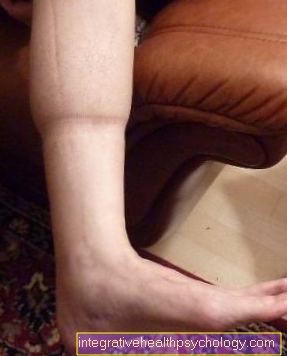
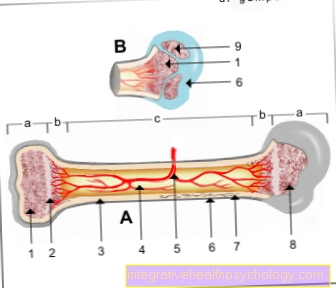
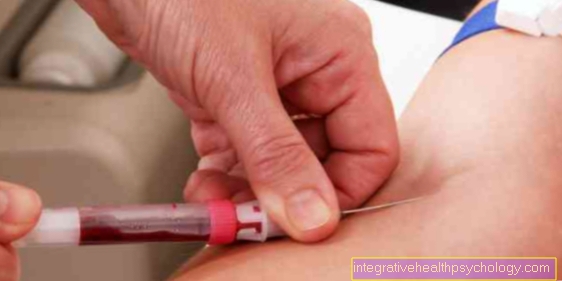



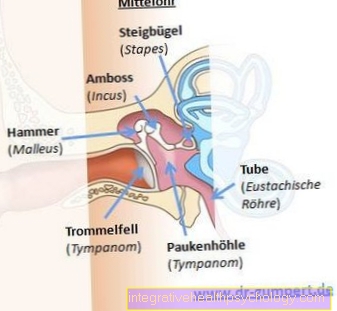

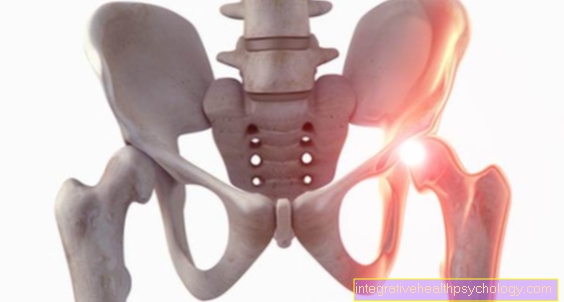
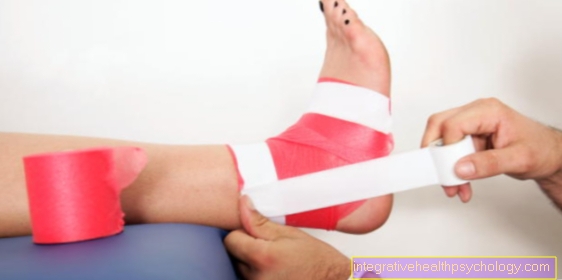


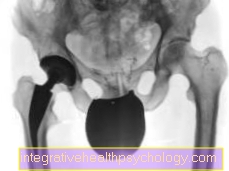
.jpg)
